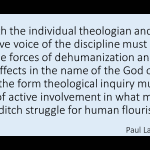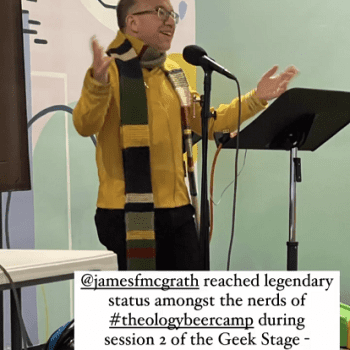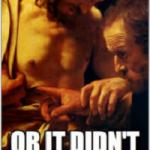Ashley Darling wrote something so poignant, insightful, and on-target that I wanted to draw attention to it. Here is an excerpt:
Certainty is not what we should seek as Christians. It is comforting but diametrically opposed to faith.
Certainty is merely hubris and arrogance masquerading as discernment. One might say that they know the earth is only 6000 years old. Others might say that they know the second coming of Christ will occur this or that way. But they don’t, and the more they prophesy their “truth,” the more they lose their credibility with unbelievers. You’re sure Jesus is the Christ, just like you were sure about X,Y,Z?
Essentially, by making predictions, we are trading our witness to the world for our own comfort and political expediency, like Esau trading his inheritance for a pot of stew (Genesis 25:29-34). It is comforting to our tired flesh to eat the hot meal, but while we indulge our fleeting hunger, we irreparably change our future and our standing in the world. Our witness and credibility are extremely precious and when we privilege end-times thinking over our present commission to unbelievers we do not treat it as if it were.
Stop claiming this or that person is the antichrist or the savior of the world. Stop worrying about the mark of the beast or a “one world government.” Jesus lived in the Roman Empire. His people were oppressed. Did he cling to his rights, buy guns and ammo, and hunker down for a shoot-out with the opposition? No. He lived peaceably within his society though he lived out his difference by example. Ultimately, he gave himself up willingly to the authorities because he knew that God would take care of him in life and in death.
If we truly believe that we serve the God of the Universe, we should have faith in him and not fear. As 1 John 4:18 states, “There is no fear in love, but perfect love drives out fear, because fear expects punishment. The person who is afraid has not been made perfect in love.” God has promised to take care of His people—not Americans—God’s Church. Christians everywhere, those who are “free” and “unfree” can rest assured that God will always take care of us despite our circumstances.
Oppression may come, but let us not anticipate it fomenting fear among the faithful and inciting ridicule among the unbelievers. Remain certain of one thing only, “I have been crucified with Christ and I no longer live, but Christ lives in me. And the life that I now live in my body, I live by faith, indeed, by the faithfulness of God’s Son, who loved me and gave himself for me” (Galatians 2:20).
Read the whole thing on the site Red Letter Christians.
https://www.redletterchristians.org/the-end-of-days-beware-of-becoming-a-false-prophet/
Of related interest: Barbara Brown Taylor writes,
Human beings never behave so badly as when they believe they are protecting God. . . . If I am not careful, I can decide that I am really much happier reading my Bible than I am entering into what God is doing in my own time and place, since shutting the book to go outside will involve the very great risk of taking part in stories that are still taking shape.
See too this review of a recent book on atheism. Here’s an excerpt:
Ryrie’s “emotional history” of atheism is clustered around two emotions that, he finds, affect our belief and unbelief in a particularly strong manner: anger (under which he places the various “grudges nurtured against an all-embracing Christian society, against the Church in particular and often also against the God who oversaw it all”) and anxiety (“the unsettling, reluctant inability to keep a firm grip on doctrines that people were convinced, with their conscious minds, were true”). There are times when “the unbelief of anger” is dominant, and times when “the unbelief of anxiety” will prevail, just as it is possible for the two “emotional streams” to converge and coexist in some form or another.
And finally:













